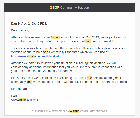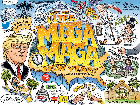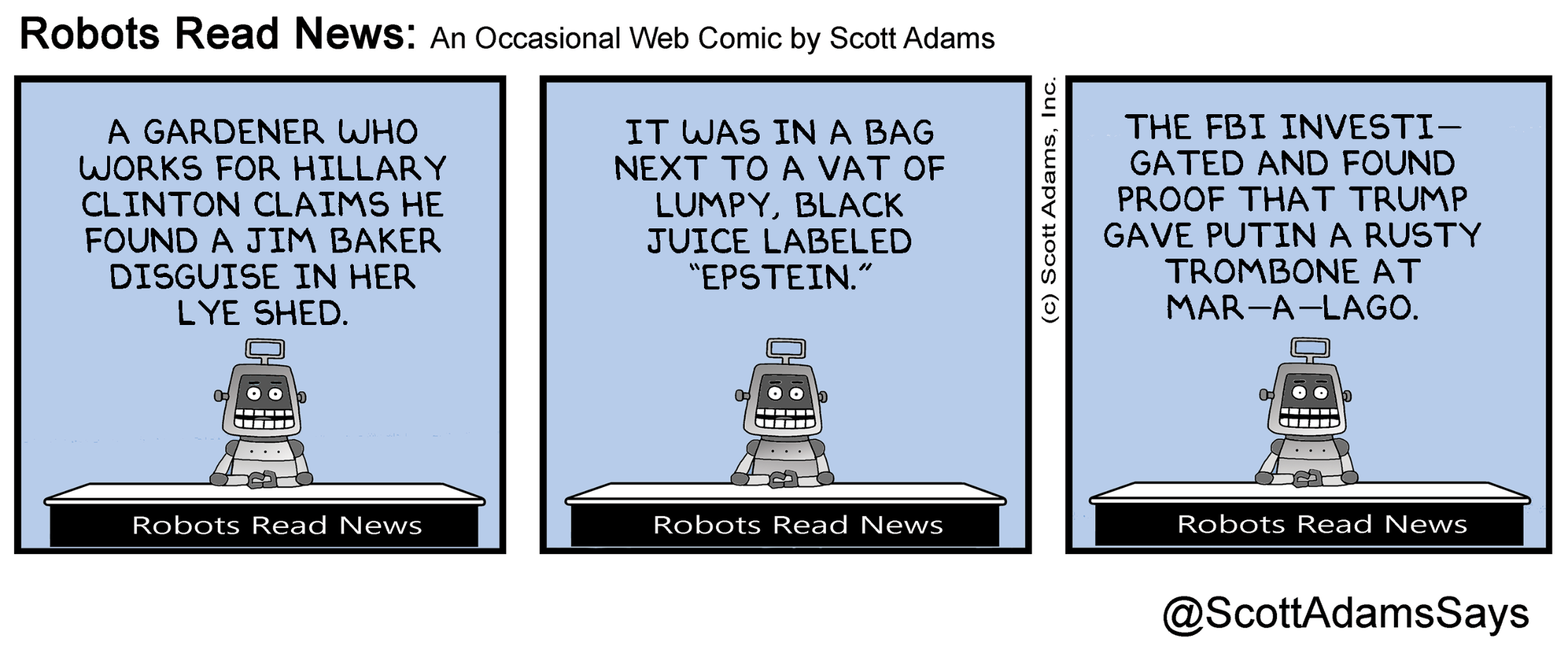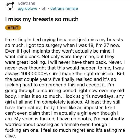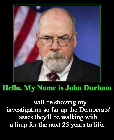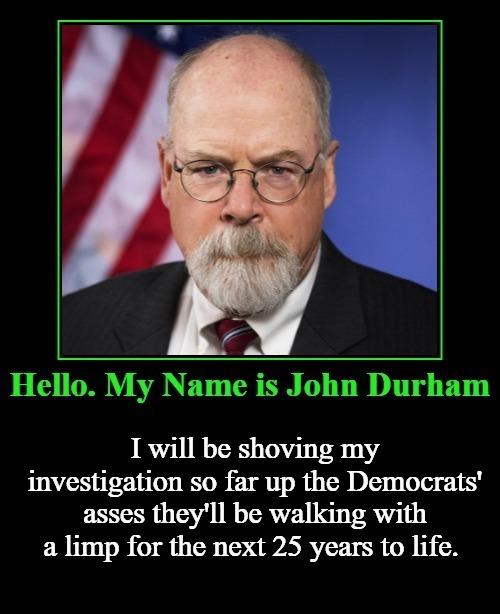Illegal alien Yasin Kanza, 25, reportedly rushed into the church of Maria Auxiliadora y San Isidro in the city Algeciras around 7 p.m., armed with a machete. Inside, the suspect savagely attacked 74-year-old priest Fr. Antonio Rodríguez, who had been celebrating the Eucharist, reported the Associated Press.
The suspected terrorist left the church bloodied, then sought out another nearby: Nuestra Señora de La Palma. There, the attacker found Diego Valencia, a sacristan responsible for caring for the church and preparing the altar for mass.
According to an interior ministry statement, the suspect began damaging the altar and the interior of the church when, according to fellow sacristan Manolo González, Valencia came over to inquire about the source of the commotion.
El Mundo reported that Kanza demanded that parishioners inside the church abandon the Catholic religion.
Recognizing the attacker for what he was, Valencia fled to the public square. The suspected terrorist caught up with him, hacking him to death.
Hunter Biden never paid his dad 49,910 for rent. The form was dated late 2018. His security deposit and time of lease (3/2017 to 2/2018) at “House of Sweden” match the the amount listed: 49,910. This was for his business Owasco. On purpose or not, he filled the form out wrong.
Here is what to know about the process for electing a House Speaker, the math to win the election on the floor, what happens if there is no winner and much, much more. House Republicans’ slim majority heading into the 118th Congress is putting McCarthy in a bind.
The House has 222 incoming Republicans, 212 incoming Democrats and one vacancy left by the death of Rep. Donald McEachin (D-Va.) shortly after his reelection. The special election to fill the vacancy for the solidly Democratic seat is on Feb. 21. A majority of the whole House is 218 votes, and five or more Republican defections would put McCarthy below that threshold.
McCarthy is in trouble because five House Republicans — Reps. Andy Biggs (Ariz.), Matt Gaetz (Fla.), Bob Good (Va.), Matt Rosendale (Mont.) and Ralph Norman (S.C.) — have explicitly said or strongly indicated they will not support McCarthy.
Several other House Republicans pushing for rules changes that would empower rank-and-file members have withheld support for McCarthy without explicitly saying they will vote against him. Those members include Reps. Scott Perry (Pa.), Chip Roy (Texas) and Lauren Boebert (Colo.).
When the House GOP conference nominated McCarthy to be Speaker in November, 36 members did not vote for him. Biggs has said he thinks there are around 20 “hard noes” on McCarthy.
All Democrats are expected to vote for incoming House Minority Leader Hakeem Jeffries (D-N.Y.) for Speaker — at least on the first ballot.
It is possible to elect a Speaker with fewer than 218 votes. Speaker Nancy Pelosi (D-Calif.) and former Speaker John Boehner (R-Ohio) were elected with 216 votes in 2021 and 2015, respectively.
Current House practice dictates that the Speaker must be elected by a majority of those voting for a specific Speaker candidate by surname. Vacancies, absences and “present” votes lower that threshold.
Unexpected absences due to illness, weather or other circumstances, then, could affect McCarthy’s math.
Theoretically, some McCarthy opponents could vote “present” rather than for an alternative candidate in order to express opposition without jeopardizing McCarthy’s path to the gavel.
For instance, if 216 Republicans vote for McCarthy, 212 vote for Jeffries, two Republicans vote for other candidates and four vote “present,” McCarthy would be elected Speaker with a majority of all those voting for a candidate.
But the five most vocal McCarthy opponents have forecasted that they will not vote “present” — keeping McCarthy’s bid in further danger.
What happens if no candidate wins a majority?
If no candidate wins a majority of votes for Speaker on the first ballot, House lawmakers will vote again and again until a Speaker is elected.
In the event of multiple ballots, the House will not necessarily continue late into the night. The last time there were multiple ballots, the House adjourned until the following day after four failed ballots. Adjourning also allows members time to negotiate and strike deals.
But the House will be able to do little else. Until a Speaker is elected, it can’t adopt a rules package governing procedure in the House. For House Republicans, uncertainty about the Speaker election has led to a delay in the conference choosing contested committee chairs.
Big money wallets are opening up for bribes. Favors are being traded. Time to quit screwing around and just get to business.
On November 22nd, 1963, my uncle, President John F. Kennedy, went to Dallas intending to condemn as “nonsense” the right-wing notion that “peace is a sign of weakness.”
He meant to argue that the best way to demonstrate American strength was not by using destructive weapons and threats but by being a nation that “practices what it preaches about equal rights and social justice,” striving toward peace instead of “aggressive ambitions.”
Despite the Cold War rhetoric of his campaign, JFK’s greatest ambition as president was to break the militaristic ideology that has dominated our country since World War II.
He told his close friend Ben Bradlee that he wanted the epitaph “He kept the peace,” and said to another friend, William Walton, “I am almost a ‘peace at any price’ president.” Hugh Sidey, a journalist and friend, wrote that the governing aspect of JFK’s leadership was “a total revulsion” of war.
Nevertheless, as James W. Douglass argues in his book JFK and the Unspeakable: Why He Died and Why It Matters, JFK’s presidency would be a continuous struggle with his own military and intelligence agencies, which engaged in incessant schemes to trap him into escalating the Cold War into a hot one.
His first major confrontation with the Pentagon, the Bay of Pigs catastrophe, came only three months into his presidency and would set the course for the next 1,000 days.
JFK’s predecessor, Dwight D. Eisenhower, had finalized support on March 17th, 1960, for a Cuban invasion by anti-Castro insurgents, but the wily general left its execution to the incoming Kennedy team. From the start, JFK recoiled at the caper’s stench, as CIA Director Allen Dulles has acknowledged, demanding assurances from CIA and Pentagon brass that there was no chance of failure and that there would be no need for U.S. military involvement. Dulles and the generals knowingly lied and gave him those guarantees.
When the invasion failed, JFK refused to order airstrikes against Castro. Realizing he had been drawn into a trap, he told his top aides, David Powers and Kenneth O’Donnell, “They were sure I’d give in to them and send the go-ahead order to the U.S. Navy aircraft carrier Essex. They couldn’t believe that a new president like me wouldn’t panic and try to save his own face. Well, they had me figured all wrong.”
JFK was realizing that the CIA posed a monumental threat to American democracy. As the brigade faltered, he told Arthur Schlesinger that he wanted to “splinter the CIA into a thousand pieces and scatter it to the winds.”
The next confrontation with the defense and intelligence establishments had already begun as JFK resisted pressure from Eisenhower, the Joint Chiefs and the CIA to prop up the CIA’s puppet government in Laos against the communist Pathet Lao guerrillas. The military wanted 140,000 ground troops, with some officials advocating for nuclear weapons. “If it hadn’t been for Cuba,” JFK told Schlesinger, “we might be about to intervene in Laos. I might have taken this advice seriously.” JFK instead signed a neutrality agreement the following year and was joined by 13 nations, including the Soviet Union.
His own instincts against intervening with American combat forces in Laos were fortified that April by the judgment of retired Gen. Douglas MacArthur, America’s undisputed authority on fighting wars in Asia. Referring to Dulles’ mischief in Southeast Asia during the Eisenhower years, MacArthur told JFK, “The chickens are coming home to roost, and you live in the chicken coop.” MacArthur added a warning that ought to still resonate today: “Anyone wanting to commit American ground forces to the mainland of Asia should have his head examined.”
About six months into his administration, JFK went to Vienna to meet Soviet Premier Nikita Khrushchev with high hopes of beginning a process of détente and mutual nuclear disarmament. Khrushchev met his proposals with bombast and truculent indifference. The Joint Chiefs and the CIA, which had fulminated about JFK’s notion of negotiating with the Soviets, were relieved by the summit’s failure.
Six weeks later, military and intelligence leaders responded by unveiling their proposal for a pre-emptive thermonuclear attack on the Soviet Union, to be launched sometime in late 1963. JFK stormed away from the meeting in disgust, remarking scathingly to Secretary of State Dean Rusk, “And we call ourselves the human race.”
As JFK’s relationship with his military-intelligence apparatus deteriorated, a remarkable relationship with Khrushchev began. Both were battle-hardened war veterans seeking a path to rapprochement and disarmament, encircled by militarists clamoring for war.
In Kennedy’s case, both the Pentagon and the CIA believed war with the Soviets was inevitable and therefore desirable in the short term while we still had the nuclear advantage. In the autumn of 1961, as retired Gen. Lucius Clay, who had taken a civilian post in Berlin, launched a series of unauthorized provocations against the Soviets, Khrushchev began an extraordinary secret correspondence with JFK.
With the Berlin crisis moving toward nuclear Armageddon, Khrushchev turned to KGB agent Georgi Bolshakov, a top Soviet spy in Washington, to communicate directly with JFK. Bolshakov, to the horror of the U.S. State Department, was a friend of my parents and a frequent guest at our home. Bolshakov smuggled a letter, the first of 21 declassified in 1993, to JFK’s press secretary, Pierre Salinger, in a folded newspaper. In it, Khrushchev expressed regret about Vienna and embraced JFK’s proposal for a path to peace and disarmament.
On October 27th, Gen. Clay made an unauthorized armed threat to knock down the Berlin Wall using tanks equipped with dozer plows, seeking to provoke the Soviets into some action that would justify a nuclear first strike. The Kremlin responded with its own tanks, which met Clay’s forces at the border crossing known as Checkpoint Charlie. A 16-hour face-off ensued. Through my father, Attorney General Robert F. Kennedy, and Bolshakov, JFK promised that if Khrushchev withdrew his tanks within 24 hours, the U.S. would pull back 20 minutes later. Khrushchev took the risk, and JFK kept his word.
Two weeks later, with tensions still running, Khrushchev sent a second letter to JFK: “I have no ground to retreat further, there is a precipice behind me.” Kennedy realized that Khrushchev, too, was surrounded by a powerful military and intelligence complex intent on going to war. After the confrontation, Gen. Clay railed against JFK’s unwillingness to “face the risk of nuclear war” against the Soviets.
One year later, on October 16th, 1962, Kennedy saw aerial photographs proving that the Soviets had installed nuclear missiles in Cuba capable of reaching much of the eastern U.S. seaboard. The next 13 days were the most perilous in mankind’s history.
From the outset, the Pentagon, the CIA and many of JFK’s advisers urged airstrikes and a U.S. invasion of the island that, as a Soviet military commander later revealed, would have triggered a nuclear war with the Soviets. JFK opted for a blockade, which Soviet ships respected. By October 26th, the standoff was de-escalating.
Then, on October 27th, the crisis reignited when Soviet forces shot down a U.S. reconnaissance plane, killing its pilot, Maj. Rudolf Anderson. Almost immediately, the brass demanded overwhelming retaliation to destroy the Soviet missile sites. Meanwhile, Castro pushed the Kremlin military machine toward a devastating first strike.
In a secret meeting with Ambassador Anatoly Dobrynin, my father told him, “If the situation continues much longer, the president is not sure that the military will not overthrow him and seize power.”
U.S. marshals appeared at our house to take us to government bunkers in western Virginia. My brother Joe and I were anxious to go, if only to see the setup. But my father, who’d spent the previous six nights at the White House, called to say that we needed to be “good soldiers” and show up for school in Washington. To disappear, he told us, would cause public panic. That night, many people in our government went to sleep wondering if they would wake up dead.
On Monday, October 29th, the world moved back from the brink. An artfully drafted letter my father wrote with Ted Sorensen pledging that the U.S. would not invade Cuba – plus JFK’s secret agreement with Khrushchev to withdraw obsolete Jupiter missiles from Turkey – persuaded the Kremlin to back down.
My father was not exaggerating to Dobrynin the fragility of White House control over the military. During the 13 days, the president’s hold on power became increasingly tenuous as spooks and generals, apoplectic at JFK’s reluctance to attack Cuba, engaged in dozens of acts of insubordination designed to trigger a nuclear exchange.
CIA spymaster William Harvey screamed at the president and my father during a White House meeting: “We wouldn’t be in such trouble now if you guys had some balls in the Bay of Pigs.”
Defense analyst Daniel Ellsberg, who years later leaked the Pentagon Papers, reported, “There was virtually a coup atmosphere in Pentagon circles.” Incensed brass were in a state of disbelief at what they considered bald treason by the president. Spoiling for a war to end all wars, Gen. Curtis LeMay, the man who pioneered the use of napalm against civilians in Tokyo during World War II, found consolation by allowing himself to believe all was not lost. “Why don’t we go in there and make a strike on Monday anyway?” LeMay said, as he watched the crisis subside.
Khrushchev said afterward that Kennedy had won his “deep respect” during the crisis: “He didn’t let himself become frightened, nor did he become reckless. . . . He showed real wisdom and statesmanship when he turned his back on the right-wing forces in the United States who were trying to goad him into taking military action against Cuba.”
Today it’s fashionable to view the quagmire of Vietnam as a continuum beginning under Eisenhower and steadily escalating through the Kennedy, Johnson and Nixon administrations. But JFK was wary of the conflict from the outset and determined to end U.S. involvement at the time of his death.
JFK inherited a deteriorative dilemma. When Eisenhower left office, there were by official count 685 military advisers in Vietnam, sent there to help the government of President Ngo Dinh Diem in its battle against the South Vietnamese guerrillas known as the Viet Cong and the North Vietnamese soldiers deployed by Communist ruler Ho Chi Minh, who was intent on reunifying his country.
Eisenhower explained that “the loss of South Vietnam would set in motion a crumbling process that could, as it progressed, have grave consequences for us.”
Ho Chi Minh’s popularity in the south had already led Dulles’ CIA to sabotage national elections required by the Geneva Accords, which had ended France’s colonial rule, and to prop up Diem’s crooked puppet government, which was tenuously hanging on to power against the Communists. Back at home, Republican militarists were charging JFK with “losing Laos” and badgering him to ramp up our military commitment.
In JFK’s first months in office, the Pentagon asked him to deploy ground troops into Vietnam. JFK agreed to send another 500 advisers, under the assumption that South Vietnam had a large army and would be able to defend itself against communist aggression. He refused to send ground troops but would eventually commit 16,500 advisers – fewer troops than he sent to Mississippi to integrate Ole Miss – who were technically forbidden from engaging in combat missions. He told New York Times columnist Arthur Krock in 1961 that the United States should not involve itself “in civil disturbances created by guerrillas.”
For three years, that refusal to send combat troops earned him the antipathy of both liberals and conservatives who rebuked him for “throwing in the towel” in the Cold War. His critics included not just the traditionally bellicose Joint Chiefs and the CIA, but also trusted advisers and friends, including Gen. Maxwell Taylor; Defense Secretary Robert McNamara; McNamara’s deputy, Roswell Gilpatric; and Secretary of State Rusk. JFK’s ambassador to South Vietnam, Frederick Nolting Jr., reported a “virtually unanimous desire for the introduction of the U.S. forces into Vietnam” by the Vietnamese “in various walks of life.” When Vice President Lyndon Johnson visited Vietnam in May 1961, he returned adamant that victory required U.S. combat troops. Virtually every one of JFK’s senior staff concurred. Yet JFK resisted. Saigon, he said, would have to fight its own war.
As a stalling tactic, he sent Gen. Taylor to Vietnam on a fact-finding mission in September 1961. Taylor was among my father’s best friends. JFK was frank with Taylor – he needed a military man to advise him to get out of Vietnam. According to Taylor, “The last thing he wanted was to put in ground forces. And I knew that.” Nevertheless, Taylor was persuaded by hysterical military and intelligence experts across the Pacific, and had angered JFK when he came back recommending U.S. intervention. To prevent the fall of South Vietnam, Taylor suggested sending 8,000 U.S. troops under the guise of “flood relief” – a number that McNamara said was a reasonable start but should be escalated to as many as “six divisions, or about 205,000 men.” Later, Taylor would say, “I don’t recall anyone who was strongly against sending troops to Vietnam except one man, and that was the president.”
Frustrated by Taylor’s report, JFK then sent a confirmed pacifist, John Kenneth Galbraith, to Vietnam to make the case for nonintervention. But JFK confided his political weakness to Galbraith. “You have to realize,” JFK said, “that I can only afford so many defeats in one year.” He had the Bay of Pigs and the pulling out of Laos. He couldn’t accept a third. Former Vice President Richard Nixon and the CIA’s Dulles, whom JFK had fired, were loudly advocating U.S. military intervention in Vietnam, while Asian dominoes tumbled. Even The New York Times agreed. “The present situation,” the paper had warned, “is one that brooks no further stalling.” This was accepted wisdom among America’s leading foreign-policy gurus. Public sympathies in the summer of 1963 were 2-to-1 for intervention.
Despite the drumbeat from the left and right, JFK refused to send in combat troops. “They want a force of American troops,” JFK told Schlesinger. “They say it’s necessary in order to restore confidence and maintain morale. But it will be just like Berlin. The troops will march in, the bands will play, the crowds will cheer, and in four days everyone will have forgotten. Then we will be told we have to send in more troops. It’s like taking a drink. The effect wears off and you have to have another.” ...
Robert C. Tucker was a Canadian psychologist who worked with an organization called COMA – Council On Mind Abuse (not to be confused with his namesake, an American political scientist who covered the Soviet Union and wrote a biography of Stalin).
Our Tucker worked with “adult survivors and child victims of ritual abuse“ and spent time interviewing self-described “Satanists”. His book was more of a thought experiment, which tried to identify an impelling idea behind the ideology of a cult:
“with destructive cultism, however, I sensed something else animating these stories of Satanic activity and ritual abuse, something familiar yet unspoken. Satanism was a puzzle behind which it hid, or a myth beneath which it lived. Like cultism, Satanism seemed to point at something beyond itself“.
Tucker’s book is not about Satanism: it’s about a theorized class of spiritual predators he called Luciferians. In later chapters, Satanists are almost dismissed as cartoonish, lower order predators. They would be shunned by truly elite Luciferians. “Distant cousins”, at best.
Where Satanists pursue unrestrained ego and impulse gratification, Luciferians play the longest game of them all, and seek to attain Godhood itself. Pure power.
Five bucks says it was a minor. Who want's it?
Gaetz among 20 House Republicans who voted against anti-human trafficking bill
Asked about his vote, Gaetz told The Hill the measure would serve as “a backdoor loophole for illegal immigration and amnesty.” “The government’s failure to accurately and specifically define human trafficking allows this legislation to act as a backdoor loophole for illegal immigration and amnesty,” he said. “The bill also costs over half a billion dollars to implement and gives more taxpayer money to overfunded, inefficient grant programs.”
It's too good for propaganda hit pieces for us to know, apparently. I knew there was some brand of poison pill buried in there.
Bruce Willis plays both sides to the middle and kicks wholesale ass (ICYMI)
Vernon Jones For Congress @VernonForGA Straight, white males deserve a Pride Month. The Left won’t acknowledge it, but that group might just be the most discriminated group in America today.
The smart way to keep people passive and obedient is to strictly limit the spectrum of acceptable opinion, but allow very lively debate within that spectrum — even encourage the more critical and dissident views. That gives people the sense that there’s free thinking going on, while all the time the presuppositions of the system are being reinforced by the limits put on the range of the debate…
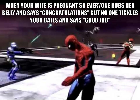

Jocelyn Benson is fighting for her political life against popular Republican Kristina Karamo in the Michigan Secretary of State race. Tonight Catherine Engelbrecht and Gregg Phillips are holding an event in Michigan to discuss their investigation into the stolen 2020 presidential election. Hundreds of ballot traffickers were able to dump tens of thousands of ballots into Michigan drop boxes to steal the election for Joe Biden. So Jocelyn Benson had to think of some kind of distraction. Moments ago she told NBC News that President Trump called for her arrest and assassination. She heard this through a second-hand source.
And the fake news mainstream media is running with it! NBC is running this hearsay tonight on her channel. They don’t even pretend to have any integrity at this point.
yay!

